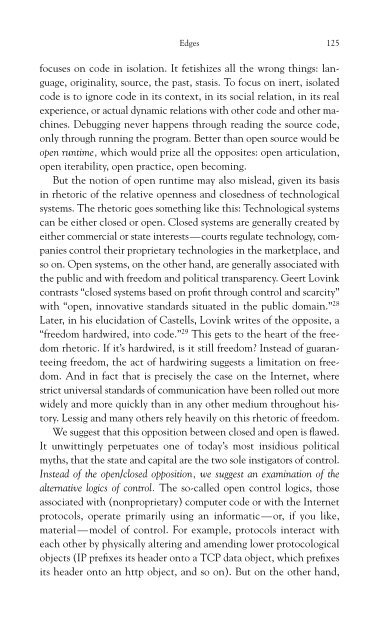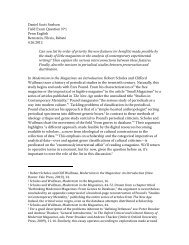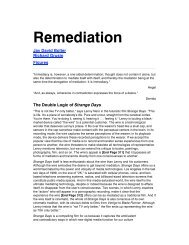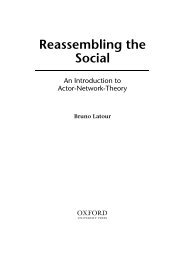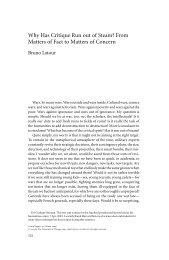The Exploit: A Theory of Networks - asounder
The Exploit: A Theory of Networks - asounder
The Exploit: A Theory of Networks - asounder
You also want an ePaper? Increase the reach of your titles
YUMPU automatically turns print PDFs into web optimized ePapers that Google loves.
Edges 125<br />
focuses on code in isolation. It fetishizes all the wrong things: language,<br />
originality, source, the past, stasis. To focus on inert, isolated<br />
code is to ignore code in its context, in its social relation, in its real<br />
experience, or actual dynamic relations with other code and other machines.<br />
Debugging never happens through reading the source code,<br />
only through running the program. Better than open source would be<br />
open runtime, which would prize all the opposites: open articulation,<br />
open iterability, open practice, open becoming.<br />
But the notion <strong>of</strong> open runtime may also mislead, given its basis<br />
in rhetoric <strong>of</strong> the relative openness and closedness <strong>of</strong> technological<br />
systems. <strong>The</strong> rhetoric goes something like this: Technological systems<br />
can be either closed or open. Closed systems are generally created by<br />
either commercial or state interests—courts regulate technology, companies<br />
control their proprietary technologies in the marketplace, and<br />
so on. Open systems, on the other hand, are generally associated with<br />
the public and with freedom and political transparency. Geert Lovink<br />
contrasts “closed systems based on pr<strong>of</strong>it through control and scarcity”<br />
with “open, innovative standards situated in the public domain.” 28<br />
Later, in his elucidation <strong>of</strong> Castells, Lovink writes <strong>of</strong> the opposite, a<br />
“freedom hardwired, into code.” 29 This gets to the heart <strong>of</strong> the freedom<br />
rhetoric. If it’s hardwired, is it still freedom? Instead <strong>of</strong> guaranteeing<br />
freedom, the act <strong>of</strong> hardwiring suggests a limitation on freedom.<br />
And in fact that is precisely the case on the Internet, where<br />
strict universal standards <strong>of</strong> communication have been rolled out more<br />
widely and more quickly than in any other medium throughout history.<br />
Lessig and many others rely heavily on this rhetoric <strong>of</strong> freedom.<br />
We suggest that this opposition between closed and open is flawed.<br />
It unwittingly perpetuates one <strong>of</strong> today’s most insidious political<br />
myths, that the state and capital are the two sole instigators <strong>of</strong> control.<br />
Instead <strong>of</strong> the open/ closed opposition, we suggest an examination <strong>of</strong> the<br />
alternative logics <strong>of</strong> control. <strong>The</strong> so - called open control logics, those<br />
associated with (nonproprietary) computer code or with the Internet<br />
protocols, operate primarily using an informatic—or, if you like,<br />
material—model <strong>of</strong> control. For example, protocols interact with<br />
each other by physically altering and amending lower protocological<br />
objects (IP prefixes its header onto a TCP data object, which prefixes<br />
its header onto an http object, and so on). But on the other hand,


